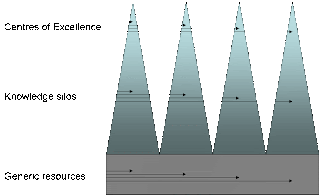- single perspective or "lens" - single dimension of success
- community of practice - regular conferences and other tribal get-togethers where practitioners can share experience
- established "body of knowledge"
- industrialized practice - for example, armies of consultants from the large firms executing standard recipes
2. The generic problems with these "best practices" are becoming increasingly visible.
- the communities of practice don't talk to each other
- the bodies of knowledge are isolated knowledge silos
- the simple and obvious problems have already been tackled (so-called "low-hanging fruit"), the practices are getting more complicated and convoluted, and the original insights have got diluted or even lost
- diminishing returns from "best practice" solutions
- increasing risk and reduced returns for "best practice" consultancy
- increasing disappointment and high failure rate of large complex change programs
- system leadership - engaging boldly, reflectively and collaboratively
- lenscraft - combining multiple perspectives on complex system problems

I take a more philosophical stance on the nature of best practice and next practice.
ReplyDeleteThe process of formulating best practice was never open and inclusive. It was dominated by vested interests on both the supply side and demand side. If we said it was Stalinist we would not be so far wrong. What happens when a practice is imposed is that its meanings change. My favourite practice quote is from Ronald Stamper who said that if you want to change the meaning of a piece of information you should attach a budget to it. And that was way before goverement targetitis. So I would claim that people are (still) interested in best practice in order to avoid taking responsibility for the outcomes. That tells us everything we need to know.
I am not as cynical as that sounds. Next practice says that I should deliberately open up a space that shows where the real work is, where this is precisely not the problem we solved last time. We can do this by resisting closure, by refusing to say that we understand what needs to be done. There are both supply side and demand side players who absolutely resist this and want to write contracts that allocate risk. And we know where that leads.
So I am interested in next practice because it is next and refuses closure.